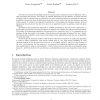Free Online Productivity Tools
i2Speak
i2Symbol
i2OCR
iTex2Img
iWeb2Print
iWeb2Shot
i2Type
iPdf2Split
iPdf2Merge
i2Bopomofo
i2Arabic
i2Style
i2Image
i2PDF
iLatex2Rtf
Sci2ools
116
click to vote
IANDC
2008
2008
Tree exploration with advice
We study the amount of knowledge about the network that is required in order to efficiently solve a task concerning this network. The impact of available information on the efficiency of solving network problems, such as communication or exploration, has been investigated before but assumptions concerned availability of particular items of information about the network, such as the size, the diameter, or a map of the network. In contrast, our approach is quantitative: we investigate the minimum number of bits of information (bits of advice) that has to be given to an algorithm in order to perform a task with given efficiency. We illustrate this quantitative approach to available knowledge by the task of tree exploration. A mobile entity (robot) has to traverse all edges of an unknown tree, using as few edge traversals as possible. The quality of an exploration algorithm A is measured by its competitive ratio, i.e., by comparing its cost (number of edge traversals) to the length of the...
Related Content
| Added | 10 Dec 2010 |
| Updated | 10 Dec 2010 |
| Type | Journal |
| Year | 2008 |
| Where | IANDC |
| Authors | Pierre Fraigniaud, David Ilcinkas, Andrzej Pelc |
Comments (0)

